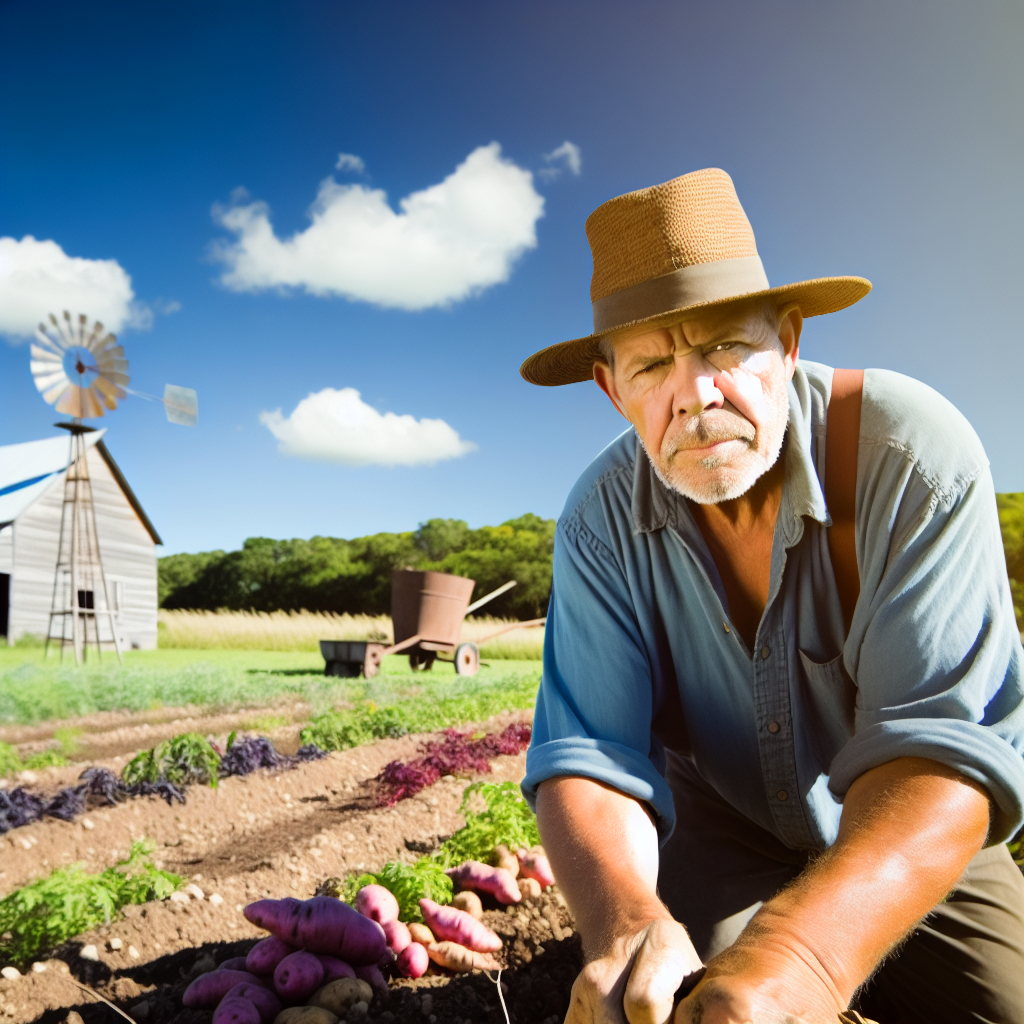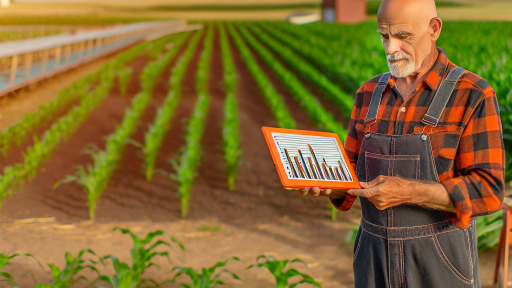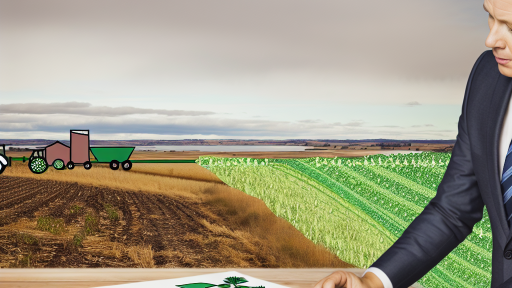Introduction to Specialty Crop Production and Its Importance
Specialty crop production offers unique opportunities for farmers.
These crops can diversify their production systems effectively.
Farmers can cultivate a range of fruits, vegetables, and nuts.
Moreover, specialty crops often yield higher profit margins.
As a result, they can enhance the economic stability of farms.
Understanding Specialty Crops
Specialty crops encompass a wide variety of plants.
Common examples include herbs, mushrooms, and ornamental plants.
These crops have specific market demands and consumer preferences.
Each type can serve different niches in the agricultural market.
Economic Benefits of Specialty Crop Production
Growing specialty crops can significantly boost farm income.
They often cater to local and niche markets well.
Farmers can benefit from the increased consumer interest in fresh produce.
Additionally, specialty crops often support agritourism.
This approach brings new revenue streams to farm operations.
Environmental Benefits
Specialty crops can enhance biodiversity in farming systems.
Transform Your Agribusiness
Unlock your farm's potential with expert advice tailored to your needs. Get actionable steps that drive real results.
Get StartedCrop diversification helps improve soil health and resilience.
These crops can also reduce pest and disease pressures.
Consequently, farmers may rely less on chemical inputs.
Challenges in Specialty Crop Production
Despite their many benefits, growing specialty crops has challenges.
Farmers may face issues related to market access and competition.
Additionally, climate variability can impact yields significantly.
Moreover, labor requirements for growing and harvesting can be intensive.
Strategies for Successful Specialty Crop Farming
To succeed, farmers should start with market research.
Understanding consumer trends will guide their crop choices.
Collaborating with local farmers can foster knowledge sharing.
Investing in sustainable practices will enhance productivity.
Finally, effectively marketing specialty crops can attract more buyers.
Benefits of Diversification for Farmers
Economic Stability
Diversifying crops enhances economic stability for farmers.
This strategy reduces reliance on a single crop.
Consequently, it lowers risk during market fluctuations.
A wider variety of crops can yield different financial returns.
Thus, farmers can better handle unpredictable weather events.
Improved Soil Health
Planting a variety of crops benefits soil health.
Diverse root structures promote better soil structure.
This variety also enhances nutrient cycling in the soil.
Moreover, different crops can suppress pests naturally.
This reduces the need for chemical interventions.
Market Opportunities
Diversification opens new market opportunities for farmers.
Specialty crops often have less competition in the market.
Showcase Your Farming Business
Publish your professional farming services profile on our blog for a one-time fee of $200 and reach a dedicated audience of farmers and agribusiness owners.
Publish Your ProfileFarmers can cater to niche markets for specific crops.
This approach can improve profit margins significantly.
Additionally, it allows for more flexible marketing strategies.
Resilience Against Climate Change
Variety in crop production increases resilience against climate change.
Diverse crops adapt differently to environmental stressors.
This means that some crops may thrive despite changing conditions.
Farmers can ensure food security by broadening their crop selection.
This adaptability will become crucial in the coming years.
Types of Specialty Crops: A Comprehensive Overview
Introduction to Specialty Crops
Specialty crops provide unique opportunities for farmers.
They often yield higher profits than traditional crops.
Additionally, farmers can diversify their production portfolios.
Herbs and Spices
Herbs and spices constitute a significant category of specialty crops.
They enhance culinary dishes with flavor and aroma.
Common examples include basil, cilantro, and saffron.
These crops require specific growing conditions to thrive.
Culinary Uses
Herbs are widely used in cooking for seasoning.
Spices add depth and complexity to various cuisines.
Moreover, they are popular in health and wellness markets.
Market Trends
The demand for organic herbs and spices is rising.
Farmers observed increased interest in local sourcing.
Furthermore, culinary tourism boosts sales of specialty herbs.
Flowers and Ornamentals
Flowers and ornamentals are another vital segment of specialty crops.
They contribute to landscaping and interior design.
Varieties include roses, orchids, and ornamental grasses.
These crops often require artistic skill and knowledge.
Landscape Design Applications
Ornamental plants enhance residential and commercial landscapes.
They create aesthetic appeal and contribute to property value.
Seasonal flowers play a role in event decorations.
Market Opportunities
The floral industry continually grows, opening new avenues.
Online flower shops have expanded distribution channels.
Additionally, events like weddings offer lucrative markets.
Fruits and Vegetables
Certain fruits and vegetables can also be considered specialty crops.
These crops often fulfill niche markets or gourmet segments.
Examples include heirloom tomatoes, exotic berries, and specialty peppers.
Consumer Preferences
Today’s consumers seek unique flavors and textures.
Heirloom varieties often attract food enthusiasts.
Farmers can benefit from establishing direct-to-consumer sales.
Retail Channels
Specialty fruits and vegetables thrive in farmers’ markets.
Health-conscious consumers frequent organic stores.
Additionally, restaurants seek unique produce for their menus.
Showcase Your Farming Business
Publish your professional farming services profile on our blog for a one-time fee of $200 and reach a dedicated audience of farmers and agribusiness owners.
Publish Your ProfileNuts and Seeds
Nuts and seeds are gaining popularity as specialty crops.
These products are known for their health benefits.
Common varieties include almonds, walnuts, and chia seeds.
Nutritional Advantages
Nuts and seeds are rich in essential nutrients and healthy fats.
They are often featured in health food trends.
Market demand continues to rise due to health awareness.
Farm Production Strategies
Implementing integrated pest management enhances crop yields.
Diverse planting practices support sustainable farming.
Moreover, contract sales can secure profitable markets for farmers.
Uncover the Details: Implementing Sustainable Practices In Agritourism Operations
Assessing Soil and Climate Suitability for Specialty Crops
Understanding Soil Requirements
Every specialty crop has unique soil needs.
Therefore, it’s crucial to analyze soil composition.
Check for nutrient levels, pH balance, and texture.
For instance, crops like saffron thrive in sandy soils.
On the other hand, rich loamy soils support diverse vegetables.
Conducting Soil Tests
Regular soil testing enhances crop success rates.
Use laboratories that offer comprehensive analysis services.
Such tests identify nutrient deficiencies and toxic substances.
Moreover, they help in refining fertilization strategies.
As a farmer, timely testing improves soil management.
Evaluating Climate Factors
Climate significantly impacts specialty crop production.
Start by examining average temperatures and rainfall patterns.
Certain crops prefer warm climates, while others thrive in cooler conditions.
For example, basil grows best in warm, sunny weather.
Conversely, spinach flourishes in cooler temperatures.
Understanding Growing Seasons
Each crop has its optimal growing season.
Understanding this helps plan planting and harvesting schedules.
Monitor local climate data for accurate seasonal predictions.
This knowledge allows for better crop planning and selection.
Utilizing Microclimates
Microclimates can enhance crop growth potential.
Identify areas on your property that may have unique conditions.
Nearby bodies of water can moderate temperature fluctuations.
Additionally, hills or forests can provide windbreaks and shade.
Leverage these microclimates to cultivate specific specialty crops.
Assessing Geographic Location
Your geographic location influences crop success rates.
Research how region-specific factors affect growth.
For instance, coastal areas often experience milder temperatures.
In contrast, inland regions may face extreme weather variations.
Understanding these geographic realities will guide crop selection.
Implementing Sustainable Practices
Sustainable practices improve soil health and productivity.
Showcase Your Farming Business
Publish your professional farming services profile on our blog for a one-time fee of $200 and reach a dedicated audience of farmers and agribusiness owners.
Publish Your ProfileExamples include crop rotation and cover cropping.
These techniques reduce soil erosion and enhance nutrient retention.
Incorporating organic inputs can also benefit soil quality.
Aligning with sustainable strategies supports long-term success.
Find Out More: Sustainable Supply Chain Strategies for Modern Farmers
Market Trends and Consumer Demand for Specialty Crops
Rising Consumer Interest
Consumers increasingly seek specialty crops for their unique flavors.
This demand drives farmers to diversify their crop portfolios.
Moreover, health-conscious consumers prefer nutrient-dense options.
They appreciate the distinct tastes specialty crops offer.
As a result, this trend creates opportunities for local farmers.
Emerging Trends in Specialty Crops
Market trends indicate a growing interest in heirloom varieties.
These crops provide unique benefits and appeal to niche markets.
Additionally, organic specialty crops continue to gain traction.
Consumers often associate organic with better quality and sustainability.
Furthermore, the rise of plant-based diets fuels this interest.
Economic Potential
Specialty crops tend to fetch higher prices in local markets.
This premium pricing allows farmers to boost their revenues.
Moreover, farmers can capitalize on direct-to-consumer sales through farmers’ markets.
Online sales channels also offer substantial economic benefits.
By tapping into these channels, farmers can reach wider audiences.
Impact of Social Media on Consumer Choices
Social media platforms play a crucial role in promoting specialty crops.
Visual content draws attention to unique crop varieties.
Influencers often showcase their culinary creations with these ingredients.
This exposure stimulates consumer interest in lesser-known crops.
As a result, farmers see increased demand for their specialty products.
Challenges and Considerations
While the market for specialty crops grows, challenges remain.
Farmers must consider the climatic requirements of these crops.
Moreover, there can be increased risks of pest infestations.
Additionally, some specialty crops require specific knowledge and skills.
Therefore, education and training are vital for success.
You Might Also Like: Protect Your Farm: Top Risk Management Tips
Financial Considerations for Transitioning to Specialty Crop Farming
Understanding Initial Costs
Transitioning to specialty crop farming requires careful financial planning.
Initial costs can vary significantly based on crop selection.
Investments in high-quality seeds or starter plants may be necessary.
Additionally, purchasing specialized equipment is often essential.
Land preparation and soil improvement also incur upfront expenses.
Estimating Ongoing Operational Costs
Ongoing operational costs must be accurately estimated.
Labor costs can increase, particularly with manual harvests.
Moreover, irrigation systems may require significant maintenance costs.
There are also recurring expenses for pest management and fertilizers.
Showcase Your Farming Business
Publish your professional farming services profile on our blog for a one-time fee of $200 and reach a dedicated audience of farmers and agribusiness owners.
Publish Your ProfileUnderstanding these costs can inform pricing strategies for the produce.
Potential Revenue Streams
Diversifying crop offerings can enhance financial stability.
Specialty crops often command higher market prices.
Establishing a CSA (Community Supported Agriculture) program can generate steady income.
Moreover, local markets and restaurants may seek unique produce options.
Online sales could also provide an additional revenue channel.
Accessing Financial Resources
Farmers should explore various financial resources to support the transition.
Grants and subsidies may be available through government programs.
Loan options can provide necessary funding for equipment and supplies.
Engaging with local agricultural organizations may uncover additional resources.
Networking with experienced specialty crop farmers can offer valuable insights.
Risk Management Strategies
Every new venture carries inherent risks, especially in agriculture.
Implementing crop insurance can protect against potential losses.
Diversifying crop types can mitigate the impact of market fluctuations.
Close monitoring of market trends helps in making informed decisions.
Additionally, developing contingency plans prepares farmers for unexpected challenges.
Learn More: Sustainable Livestock Farming Practices for Environmental Stewardship

Managing Risks Associated with Specialty Crop Production
Understanding Production Risks
Producing specialty crops involves distinct risks.
Weather fluctuations can significantly impact crop yields.
Diseases and pests may threaten the health of crops.
Additionally, market fluctuations can affect profitability.
Assessing Financial Risks
Specialty crop production can require substantial investment.
Farmers must calculate potential returns carefully.
Unexpected expenses can lead to financial strain.
Therefore, assessing the cost-benefit ratio is crucial.
Implementing Risk Mitigation Strategies
Farmers can adopt various strategies to manage risks.
Crop insurance provides financial protection against losses.
Diversifying crops can reduce dependence on a single yield.
Maintaining good agricultural practices enhances resilience.
Utilizing Technology
Adopting technology can also mitigate risks.
Precision agriculture helps optimize resource use.
Farm management software can aid in decision-making.
Building Strong Relationships
Networking with fellow farmers can offer support.
Joining cooperatives may lead to shared resources.
Strong customers can provide market stability.
Regularly Evaluating Farm Management Practices
Continuous evaluation of practices enhances risk management.
Farmers should analyze performance data regularly.
They must adapt to changes in market and environmental conditions.
Furthermore, learning from past experiences is vital.
Case Studies of Successful Specialty Crop Diversification
Small Scale Diversification
Maria and Carlos Ortiz run a small farm in Southern Arizona.
Showcase Your Farming Business
Publish your professional farming services profile on our blog for a one-time fee of $200 and reach a dedicated audience of farmers and agribusiness owners.
Publish Your ProfileThey specialize in growing organic heirloom tomatoes.
Last year, they introduced a variety of specialty peppers.
This addition attracted local chefs looking for unique ingredients.
As a result, their revenue increased by 25%.
Moreover, they gained recognition at regional farmer’s markets.
Farmers’ Cooperative Success
The North Valley Farmers’ Cooperative formed a group of diverse growers.
The cooperative specializes in fruits and nuts not typically grown in the area.
Members share insights to market their specialty crops effectively.
They collectively sell their products at local supermarkets.
Consequently, they strengthened their bargaining power.
Additionally, their cooperative model encourages sustainable farming practices.
Innovative Technology Adoption
Green Acres Farm in New York adopted vertical farming technology.
They grow specialty greens that thrive in small spaces.
This approach maximizes their yield and reduces resource use.
Furthermore, they supply restaurants with fresh, organic greens year-round.
As a result, they established a loyal customer base.
This innovative shift boosted their profits significantly.
International Market Expansion
The Blue Sky Farm in California successfully exported avocados to Asia.
They partnered with export companies for smoother transactions.
This moved them into an emerging international market.
Consequently, their sales revenue surged by 50%.
Additionally, they accessed various resources for crop management.
This strategy allowed them to diversify their income streams.
Community Supported Agriculture (CSA) Model
Sunset Harvest implemented a CSA model to engage local consumers.
This approach fosters a direct relationship between farmers and customers.
They offered shares of various specialty crops throughout the season.
Consumers appreciated the variety and freshness of produce.
This model provided them with stable cash flow from subscriptions.
Moreover, it helped build community trust and loyalty.
Best Practices for Marketing and Selling Specialty Crops
Identifying Your Target Market
Understanding your target market is essential for success.
Consider demographics, preferences, and purchasing habits.
Conduct surveys to gather valuable insights.
Analyze competitor offerings to find market gaps.
This knowledge will guide your marketing strategy.
Building Strong Brand Identity
A strong brand identity differentiates you from competitors.
Choose a memorable name that resonates with your audience.
Design an appealing logo that reflects your brand values.
Utilize a consistent color palette across all platforms.
Engage in storytelling to connect emotionally with consumers.
Utilizing Digital Marketing Strategies
Digital marketing is vital for reaching a wider audience.
Showcase Your Farming Business
Publish your professional farming services profile on our blog for a one-time fee of $200 and reach a dedicated audience of farmers and agribusiness owners.
Publish Your ProfileCreate a user-friendly website featuring your specialty crops.
Utilize SEO techniques to improve online visibility.
Leverage social media platforms to showcase your products.
Implement email marketing to share promotions and updates.
Engaging in Local Farmers Markets
Participating in local farmers markets enhances visibility.
Network with other farmers and local businesses.
Set up an attractive booth to draw in customers.
Offer samples to entice potential buyers.
Utilize signage to communicate your story and values.
Creating Partnerships with Local Businesses
Build partnerships with local restaurants and grocery stores.
Offer exclusive deals to encourage bulk purchases.
Provide marketing support to promote your crops.
Attend local food events to meet potential partners.
This collaboration can increase your brand’s reach.
Implementing Direct-to-Consumer Sales Channels
Direct-to-consumer sales offer higher profit margins.
Consider online sales through eCommerce platforms.
Explore subscription-based models for regular customers.
Utilize farm-to-table concepts to attract health-conscious buyers.
Ensure your delivery methods are efficient and reliable.
Educating Consumers About Products
Education helps consumers understand the benefits of specialty crops.
Create informative content highlighting your crops’ nutritional value.
Host workshops or farm tours to share knowledge.
Include recipes and cooking tips in your marketing materials.
This establishes you as a trusted resource in the community.
Monitoring and Adapting Strategies
Regularly assess the effectiveness of your marketing strategies.
Utilize customer feedback to make improvements.
Stay informed about market trends and consumer preferences.
Be flexible and ready to adapt to changes.
This responsiveness will help sustain your business growth.
Future Trends in Specialty Crop Production and Sustainability
Emerging Crop Varieties
Farmers increasingly focus on developing new crop varieties.
These varieties often exhibit better resistance to disease.
They also adapt well to changing climate conditions.
As a result, crop yields improve significantly.
Focusing on niche markets provides new revenue opportunities.
Sustainable Agricultural Practices
Sustainable practices are gaining traction among farmers.
Crop rotation enhances soil health and reduces pests.
Organic farming methods draw consumer interest and loyalty.
Additionally, sustainable practices minimize chemical usage.
Consequently, they lead to healthier ecosystems and communities.
Technological Innovations
Technological advancements are reshaping crop production.
Showcase Your Farming Business
Publish your professional farming services profile on our blog for a one-time fee of $200 and reach a dedicated audience of farmers and agribusiness owners.
Publish Your ProfilePrecision farming tools help optimize resources efficiently.
Farmers use drones for monitoring crop health regularly.
These technologies can detect issues before they escalate.
Moreover, data analytics enhance decision-making processes.
Consumer Preferences and Market Trends
Consumer trends increasingly favor specialty crops.
Health-conscious individuals seek nutrient-dense options.
Additionally, there’s a growing interest in organic produce.
Farmers now cultivate diverse specialty crops to meet demand.
This diversification strengthens their market position.
Collaborative Efforts in the Industry
Collaboration among farmers fosters innovation and sustainability.
Agreements with local restaurants promote farm-to-table initiatives.
These partnerships bolster community support for local farmers.
Moreover, educational programs help share sustainable practices.
Ultimately, collective effort leads to a thriving agricultural sector.
Additional Resources
USDA Announces Framework for Shoring Up the Food Supply …
Market Access and Value-added Strategies in the Specialty Crops …




